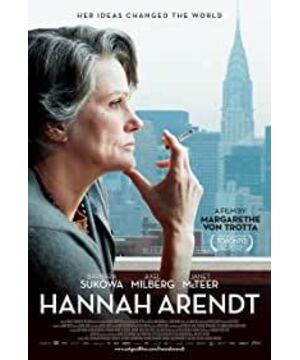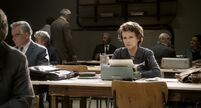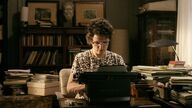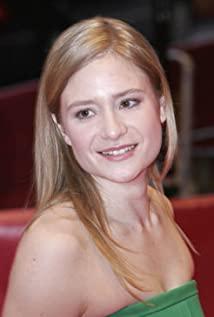The background of the film is Adolf Eichmann, a former high-ranking Nazi German official, known as the "executioner", who is on trial in Jerusalem in 1961. Hannah Arendt (Barbara Sukowa), a famous Jewish female philosopher who has lived in the United States for many years, was invited by The New Yorker to write for the trial. All Jews hope to see the ugly side of this butcher, and hope that he will be punished soon. However, Arendt saw the deeper content behind the massacre from his professional point of view.
Hannah Arendt has written a small book called Eichmann in Jerusalem: The Modern Dilemma of Ethics.
As a Jew, she was the victim, but in the "family hatred" of ordinary people, she did not follow the trend, but always kept her awake, thinking objectively and deeply. This is exactly the "ability to think" that she constantly calls out in the film.
To think independently, first of all try to get rid of emotions. The emotions here include the people around you and your own emotions. There are very few people who can think independently. There are very few people who can bravely publicize their views and dare to commit public anger. And Hannah Arendt is one such person.
The director wanted to shoot Arendt's life, and finally chose the representative Eichmann incident in her life. I think this choice is very wise, the director focused and accurately showed Arendt's thinking characteristics to everyone, and also more clearly see the origin and direction of her thinking.
She is not a god, nor is she a demon. She is just a person, just like the subjects of her research. Although she is a Jew, as she said, she loves her friends, and this is all the love she can. She doesn't decide love and hate because of race.
The ultimate evil in the world is the refusal to think about the moderation in obedience to orders to commit large-scale evil, leading to eventual moral collapse. This is the so-called "banality of evil". After the trial of Nazi Eichmann in Israel, Arendt, who is Jewish, is not afraid to point this out, because she has no special feelings for any ethnic group.
However, this does not mean that the great thinker did not have a compassionate love for humanity as a whole.
In the process of watching the movie, I also felt the radical and even extreme part of her discussion, but this is also the "radical goodness" in her mouth. She said, "Understanding does not equal forgiveness." It can also be said that understanding does not equal approval. She tries to understand the evil, not to approve or forgive it.
In the face of such a cruel human tragedy, simply crying and condemning cannot prevent it from happening again. Condemnation is what politicians and the public do. And trying to understand and search for its rationality, to search for the reasons behind it, is what a thinker or a political theorist has to do. It is their duty to get to the bottom of the surface of events. Try to understand this, and you will have a lot of admiration for Hannah Arendt. She said in the book: "Under the totalitarian rule of evil, the disaster caused by people's failure to think can be far greater than the sum of the harm caused by the human instinct to do evil. This is the lesson we should learn from Jerusalem." The root cause is that humans can be vigilant against it and prevent it from continuing to do evil. This is exactly how Arendt insisted on thinking and expressing his thoughts and expressions under the public opinion and current situation at that time, without fear of what people say.
As the saying goes, when humans think, God laughs.
Human thinking is a hundred times behind the development of technology and material. Some people should run bravely and work hard to lead mankind to the promised land of spirit.
View more about Hannah Arendt reviews










